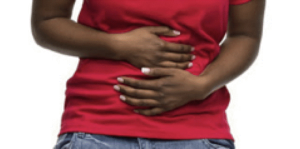Even though they are rarely life threatening, peptic ulcer can cause serious discomfort to the extent of not being able to eat leading to weight loss. If the ulcer is not treated in good time, it becomes severe and chronic sometimes causing perforation, intestinal blockage, internal bleeding and other severe illnesses that may require emergency surgery.
Symptoms
Do you feel any of these symptoms? Pain or discomfort in the upper left abdomen as well as heartburn, indigestion, nausea, and inability to pass gas. These are signs of peptic ulcer. The most common symptom is a burning sensation or pain in the middle of the abdomen between chest and belly button. The pain will be more intense when your stomach is empty, and it can last for a few minutes to several hours. At this stage of peptic ulcer, according to experts, the ailment is still mild and medications, on an outpatient basis, may well still be enough for treatment.
But if you feel sudden, severe pain in the upper abdominal area, vomiting blood, vomiting substances that look like coffee grounds, bloody stools, rapid heartbeat and many others; Experts say they are warning signs that the ulcer has become severe and may require medical emergency.

The three serious complications of a peptic ulcer that may require emergency intervention include:
–Perforation is a hole in the wall of the stomach or small intestine. A perforated ulcer is a serious condition in which an untreated ulcer can burn through the wall of the stomach, allowing digestive juices and food to seep into the abdominal cavity. This can lead to inflammation of the intestinal wall caused by infection.
–Internal bleeding occurs if there is a broken blood vessel in the stomach or small intestine. This can lead to a drop in blood pressure and symptoms like dizziness, weakness, pale skin, rapid heartbeat, and fainting. Some people experience bloody vomit, while others will develop dark, tarry stools.
–Intestinal blockage occurs when food is prevented from moving from the stomach into duodenum (the passage to the small intestine). Ulcers located at the end of the stomach can cause swelling and scarring, that causes narrowing or closing of the intestinal passage. Symptoms include severe stomach pain, cramps, nausea, vomiting, constipation, and the inability to pass gas.
Peptic Ulcer Types & Causes
Ulcers form when the lining of the stomach or duodenum becomes eroded resulting into stomach or gastric ulcer and duodenal ulcer respectively.
Most ulcers occur in the first layer of the inner lining. But, If the ulcer erodes beyond the first layer of the inner lining, it creates a hole that goes all the way through the intestine, causing perforation.
The major two protagonists of peptic ulcers are:
-Helicobacter pylori (H. pylori) bacterium infection
-Prolonged use or overuse of non-Steroidal anti- Inflammation Drugs (NSAIDs)- aspirin, ibuprofen, or naproxen and others

Some medical researchers describe peptic ulcer causation as result of imbalance between defenders and attackers in the abdominal field.
Peptic ulcers occur when acid in the digestive tract eats away at the inner surface of the stomach or small intestine. The acid can create a painful open sore that may bleed.
Digestive tract is coated with a mucous layer that normally protects against acid. But if the amount of acid is increased or the amount of mucus is decreased, ulcer can develop.
Emeka Ray-Offor and Kalanne Ada Opusunju in a study “Current status of peptic ulcer disease in Port Harcourt metropolis, Nigeria” noted that peptic ulcer develop as a result of imbalance between mucosal protective factors (e.g. mucous production, bicarbonate secretion and blood flow) and mucosal aggressive factors (e.g. acid and pepsin).
Similarly, W. D. W. Rees & C. J. Shorrock in a study titled “Aggressive and Protective Factors in the Pathogenesis of Peptic Ulcer Disease” depict the disease as arising from an imbalance in the equilibrium that normally exists between the stomach’s “protective” barriers and “aggressive” luminal factors such as acid, pepsin, refluxed bile salts and ingested drugs.
What the two studies simply imply is that if the potency of the defenders (mucosal coats) to fight the assault of the attackers (acids and drugs) the result is a PUD (peptic ulcer disease)
Risk Factors
In addition to having risks related to taking NSAIDs, you may have an increased risk of peptic ulcers if you:
–Smoke. Smoking may increase the risk of peptic ulcers in people who are infected with H. pylori.
–Drink alcohol. Alcohol can irritate and erode the mucous lining of your stomach, and it increases the amount of stomach acid that’s produced.
–Have untreated stress.
–Eat spicy foods.
These factors alone do not cause ulcers, but they can make ulcers worse and more difficult to heal.
Treatment
Treatment of PUDs vary depending on the cause of the ulcer. Most non -severe ulcers can be treated with a prescription from a qualified doctor, but in rare cases, surgery may be required.
Antibiotic medications to kill H. pylori. If H. pylori is found in your digestive tract, your doctor may recommend a combination of antibiotics to kill the bacterium. These may include amoxicillin (Amoxil), clarithromycin (Biaxin), metronidazole (Flagyl), tinidazole (Tindamax), tetracycline and levofloxacin.
Medications that block acid production and promote healing. Proton pump inhibitors — also called PPIs — reduce stomach acid by blocking the action of the parts of cells that produce acid. These drugs include the prescription and over-the-counter medications omeprazole (Prilosec), lansoprazole, rabeprazole, esomeprazole and pantoprazole.
Long-term use of proton pump inhibitors, particularly at high doses, may increase your risk of hip, wrist and spine fracture. Ask your doctor whether a calcium supplement may reduce this risk.
Medications to reduce acid production. Acid blockers — also called histamine (H-2) blockers — reduce the amount of stomach acid released into your digestive tract, which relieves ulcer pain and encourages healing.
Available by prescription or over the counter, acid blockers include the medications famotidine, cimetidine and nizatidine.
Antacids that neutralize stomach acid. Your doctor may include an antacid in your drug regimen. Antacids neutralize existing stomach acid and can provide rapid pain relief. Side effects can include constipation or diarrhea, depending on the main ingredients.
Antacids can provide symptom relief but generally aren’t used to heal your ulcer.
Medications that protect the lining of your stomach and small intestine. In some cases, your doctor may prescribe medications called cytoprotective agents that help protect the tissues that line your stomach and small intestine.
–bismuth supplement
–stopping use of all NSAIDs
Experts say symptoms of an ulcer may subside quickly with treatment. But they warn “even if your symptoms disappear, you should continue to take any medication prescribed by your doctor”. This is especially important with H. pylori infections, to make sure that all bacteria are eliminated.
Side effects of medications used to treat stomach ulcers can include:
nausea
dizziness
headaches
diarrhea
abdominal pain
These side effects, according to medical practitioners, are typically temporary. In case any of these side effects cause extreme discomfort, experts say talk to your doctor about changing your medication.
Surgical treatment
In very rare cases, a complicated stomach ulcer will require surgery. This may be the case for ulcers that:
continue to return; don’t heal; bleed; tear through the stomach; keep food from flowing out of the stomach into the small intestine. For the appropriate surgical treatment and procedure, consult the doctors.
Healthful diet
-Eat foods that may help fight off H. pylori or boost the body’s own healthy bacteria including:
broccoli, cauliflower, cabbage, and radishes leafy greens, such as spinach and kale
-probiotic-rich foods, such as sauerkraut, miso, kombucha, yogurt (especially with lactobacillus and Sacharomyces); apples, blueberries, raspberries, strawberries, and blackberries
People with stomach ulcers may have accompanying acid reflux disease, experts say that it is a good idea to stay away from spicy and sour foods while an ulcer is healing.
Home remedies for stomach ulcers
Apart from eating healthy foods, the following items may help reduce the effects of H. pylori, the bacteria responsible for many stomach ulcers. They include:
-probiotics (good bacteria supplements);
-honey
-glutamine (food sources include chicken, fish, eggs, spinach, and cabbage)
Incidence & Prevalence
With an annual incidence of around 4.6 million cases, Ulcers can develop at any age but are rare in teenagers and even rarer in children. Duodenal ulcers occurring in the junction between the stomach and small intestine usually occur for the first time between the ages of 30 and 50.
A study in the Obafemi Awolowo University’s IFEMED journal said the true prevalence rate of PUD in the Nigerian populace is not certain. But, over three decades ago Nigeria was listed as an area of high PUD prevalence with perforation being the most frequent indication for surgery. According to the report, more recent studies show similar prevalence rates for DU and GU in both southern and northern Nigeria.
Another study on Prevalence and risk factors for helicobacter pylori infection in gastroduodenal diseases in Kano, Nigeria asserts that Nigerian prevalence rates of 81.7% are similar to South Africa and Kenya.
This study statistically links high degree of deprivation and lower social economic status as risk factors to contact H. pylori infection. Individuals from low socioeconomic class are more likely to be associated with low level of education, including poor health education and more tendency to living in an environment that predisposes to faecal contamination of food and water.
A Five-Year review of Perforated Peptic Ulcer Disease in Irrua Nigeria, reviewed by A. E. Dongo et al noted that gastric perforation is a far commoner disease in our environment. Perforation is often the first sign of peptic ulcer disease. Among the risk factors associated with the disease in the review include dry fasting amongst Christians as a risk factor for perforation, overcrowding, smoking etc.
Prevention
Our people say prevention is better than cure. To prevent PUD, we must prevent the spread of helicobacter pylori the bacteria that causes stomach ulcer via:
–washing of hands with soap and water on a regular basis.
–proper cleaning and general hygiene.
-Proper cooking of food and to cook it thoroughly as needed.
-Avoiding overcrowding
To prevent ulcers caused by NSAIDs:
-stop using these medications (if possible) or limit their use. If you need to take NSAIDs, be sure to follow the recommended dosage
-avoid alcohol while taking NSAIDs medications. And always take these medications with food and adequate liquids.
Publisher’s Note:
- Leave your comments in the comments box below and share the post
- Send your health related articles, stories, tips to compack2006@yahoo.co.uk for free publication.
- Like and Share our Facebook page: @citizencomfortng



It can cause Ulcer problems on conditions of being abused eg not eating before usages.Excesses of usages without considering dosage
I learnt something new today.
Thanks
Insightful
Emphasis should always be given to the side effects of abusing pain relieving tablets.In Lagos and other urban cities,many people take those tablets everyday as a routine.
An outstanding share! I have just forwarded this onto a coworker
who has been doing a little research on this. And he actually bought me lunch simply
because I stumbled upon it for him… lol. So let
me reword this…. Thanks for the meal!! But yeah, thanks for spending some time to talk about this matter here on your blog.